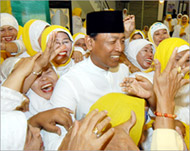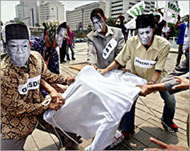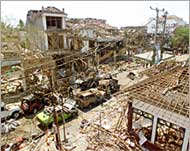Profile: Susilo Bambang Yudhoyono
The most popular politician going into Indonesia’s inaugural presidential elections on Monday, is a staunchly pro-US military officer.

Surprisingly he has remodelled his taciturn law-and-order image to become a pop-tune singing man of the people.
Retired four-star general Susilo Bambang Yudhoyono, 54, known universally by his acronym SBY, has consolidated his position as Indonesia’s newest political phenomenon.
Poll results released on Friday show support for the former general remains strong at nearly 44%.
Incumbent president Megawati Sukarnoputri is running a distant second at just over 20% the Indonesia Survey Institute results show, with former Indonesian Armed Forces (TNI) chief Wiranto and deputy House speaker Amien Rais polling just under 15% and nearly 14% respectively.
What remains to be seen is whether Yudhoyono can get the 50% plus one majority he needs to avoid a runoff election on 20 September against the second place candidate.
Image
“SBY, SBY, SBY, he’s the only man for the job,” says off-duty Jakarta taxi driver Amir Nurdin, 47.
“They’re all crooks, but I think he is not the worst. He can bring us jobs and more money for the little people like me.”
Surveys as far back as last July ranked Yudhoyono as the most respected politician in this overwhelmingly Muslim country of 220 million.
But his personal popularity really took off after he resigned as security minister in March. His Democratic party received more than eight per cent of the popular vote in April’s general elections, largely on the basis of his reputation as a “clean” candidate, untainted by scandal.
Pro-American
Despite a smear campaign that includes allegations he is a CIA agent, polls show that Yudhoyono’s personal approval ratings are high across the political spectrum. Asked who was their second choice to become president should their candidate not win, electors unanimously backed Yudhoyono.
|
“I love the United Susilo Bambang Yudhoyono, presidential candidate |
A career soldier, Yudhoyono and graduate of US military training programmes at Fort Benning, Columbus (1976 & 1982), and the Command and General Staff College at Fort Leavenworth, Texas (1991), Yudhoyono has fond memories of the US.
“I love the United States, with all its faults. I consider it my second country,” the International Herald Tribune quoted him as saying last year.
In a campaign dominated by personality rather than policy, he has benefited from several factors.
Career history
Sukarnoputri is seen as an aloof and ineffective ruler who has forgotten the orang kecil, the so-called little people, who make up the vast, impoverished underclass in Indonesian society.
 |
|
Questions have been raised on |
Wiranto’s candidacy has been hampered by deep divisions within his own party and lingering suspicions about his role in several high-profile human rights abuse cases.
A career officer who married the daughter of a commander of a feared special forces unit, Yudhoyono has proven Teflon-coated when it comes to assigning blame.
He was in East Timor in the mid-70s and early 80s in a command capacity during periods when Indonesian troops were accused of widespread human rights abuses.
Military history
He was chief of staff of the Jakarta regional command, subordinate to the current city governor Sutiyoso, when a mob backed by security forces stormed the offices of the Indonesian Democratic party, at a time when it was chaired by Sukarnoputri. Five of her supporters died, 150 were injured and more than two dozen activists disappeared.
Questions also remain about exactly what role he played in the coordinated destruction of East Timor after the population of the former Portuguese colony voted against remaining in Indonesia in a United Nations-sponsored referendum in 1999.
That same year he moved into politics, serving briefly as mining minister before taking over the security portfolio. Since that time he has served administrations that looked the other way when thousands of young Javanese Islamist militants and foreign fighters entered a religious war between Christians and Muslims in Maluku province.
Last year, he approved the brutal year-long military operation against separatists in Aceh province in North Sumatra that has resulted in at least 2000 deaths. And he has done little to stem what human rights groups claim are systematic and widespread abuses in Papua.
For and against
Yudhoyono has 15 of his fellow veterans on his campaign team. The presence of so many retired soldiers has attracted its share of domestic criticism.
 |
|
Indonesian Muslim students |
Students, civil society and human rights groups who bore the brunt of the excesses committed by security forces during the turbulent days prior to Suharto’s resignation have responded with hunger strikes and demonstrations.
His one great success has been in clamping down on suspected terrorists at home. The government appeared rudderless in the weeks immediately following the car bombing of a Bali nightclub that killed more than 200 people in October 2002.
Since that time, the national police, with significant help from the US and Australia, have hit back hard, arresting dozens of suspected al-Qaida sympathisers.
A clearly upset Yudhoyono lashed out at questions about human rights in the wake of the bombing of the US-owned Marriott hotel in Jakarta last August.
“Those who criticise about human rights being breached must understand that all the bombing victims are more important than any human rights issue,” he said.
Campaign issues
Although terrorism fails to register as a campaign issue Indonesia’s bloody recent past, has contributed to calls for tough love, what Paul Rowland of National Democratic Institute for International Affairs in Jakarta calls a “firm leader, but not an iron fist”.
 |
|
In response to the Bali bomb, SBY |
This may work to Yudhoyono’s benefit. He is seen as a proponent of military reform and a bulwark against hardliners in the highest ranks who yearn for the unquestioned authority they had during the Suharto years.
“Part of the problem in Indonesia has been a recent history of weak civilian leadership,” says Ohio State University political scientist William Liddle.
“The threat [to democracy] is not from individual retired military officers … but serving members using issues like separatism, regional ethnic tensions and religious fervour to step in and say: ‘We must save our people from themselves.’ SBY might be the figure to put these people in their place.”
It is a sentiment found on the streets of the capital.
“My parents talk about how the Suharto years were better, but I know the reformist students were brutalised by the army and police,” says 17-year-old Subianto, whose cigarette tray is covered by Yudhoyono’s image. “I think we need a strong leader who can control the corruptors and keep us safe.”